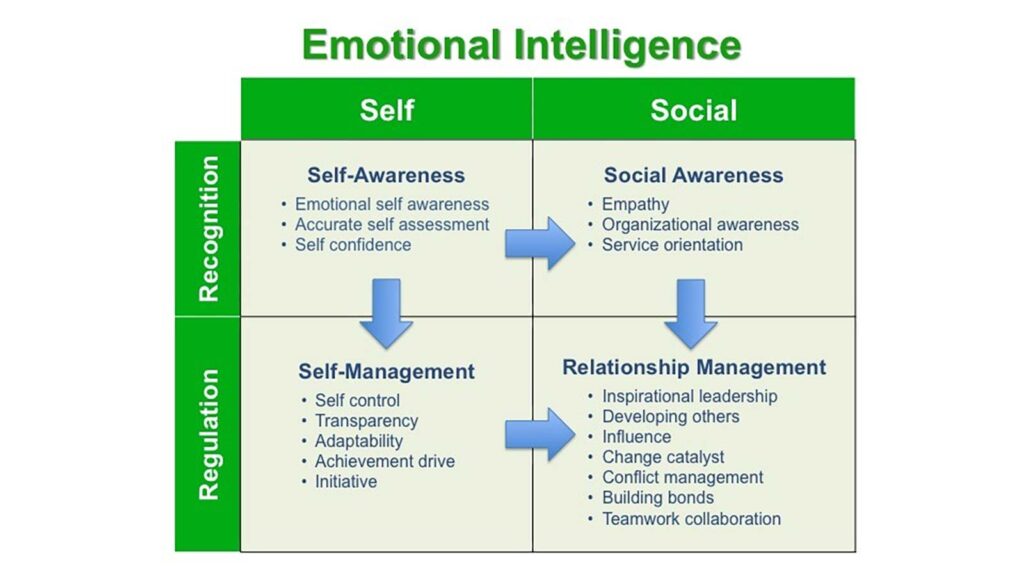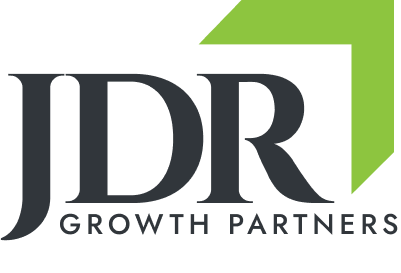In the rough and tumble world of business, many leaders once considered the softer skills such as self-awareness and empathy less important compared to intellectual abilities and technical skills. These hard charging leaders often questioned how managers could make tough decisions wisely if they “felt” too much for the people who might be affected. I have always believed that the hard and soft skills can co-exist synergistically. I’m not suggesting that intellect and technical acumen are unimportant, but that the importance of these softer skills is frequently underestimated.
I was first exposed to the concept of emotional intelligence (EQ) while attending a leadership development program at The Center for Creative Leadership in 1994. Shortly thereafter, Daniel Goleman released his seminal book, Emotional Intelligence, in which he eloquently detailed the growing need for more balanced leaders who are self-aware, self-regulated, driven to succeed, empathic, and socially adept.
In my early career, I was frequently disappointed by the lack of emotional intelligence of many leaders held up to me as success models in the world class companies where I toiled. I wanted to look up to the executive suite and see leaders who inspired me as I worked my way up the corporate ladder. As a young, aspiring leader, I found Goleman’s ideas and their growing acceptance in the business community encouraging. In a nutshell, Goleman provided compelling evidence that emotional intelligence is twice as important as technical skills or IQ. His 1998 Harvard Business Review article titled “What Makes a Leader?” quickly became a classic. Goleman and his writings gave me hope that times would change—that tone-deaf executives would give way to high EQ leaders.
Since Goleman’s first book, there has been an encouraging long-term trend toward emotional enlightenment. However, remnants of the old way of thinking and behaving persist. For example, the most intellectually gifted leader for whom I ever worked turned out to be the least emotionally intelligent person I have ever known. This business owner treated people like pawns on a corporate chessboard. He knew all the right words to say, but over time he made it clear that everyone he led was an expendable asset who existed only to serve his needs. When times were good, his IQ was impressive, and it was easier to overlook his social awkwardness. When times got tough, however, his ego and narcissism took over, and he intellectually bullied and berated people into the behaviors he desired. Most people avoided sharing bad news with him, and those courageous few people who dared to speak the undesirable truth were punished, often publicly. These days, leaders like this seldom survive, but, because he owns the company, he gets away with treating people poorly. As you might expect, his company consistently under-performs because top talent opts out. Because of rampant turnover, this leader has been left with yes-people who avoid contention, do what they are told, and are willing to accept working in an uninspiring workplace devoid of emotion and respect. Karma ultimately prevails.
Leadership Principle #7
Emotionally intelligent leaders cultivate healthier organizations. Great leaders model empathy and see the world through the eyes of others because EQ often trumps IQ.
The Leader’s Challenge
It’s easy to discount the softer side of leadership because the relationship of EQ to bottom line results isn’t always measured or obvious. Even today there are stakeholders and Board members who think you are a wimp if you even talk about this stuff. But workforce trends and values increasingly make people who ignore EQ look like dinosaurs. The continued progression of women into leadership roles is having a profound impact on the way we run companies, and the attitudes of the Millennial Generation are accelerating progress toward a workforce that expects more emotionally enlightened leaders.
To be clear, I’m a big fan of prioritizing bottom line results and accountability. Those companies who don’t ultimately underperform. But I also believe that the way short-term results are delivered will significantly impact on an organization’s ability to deliver sustainable results. Most leaders today would agree with that statement, but how many measure it? If it’s not measured, the message received by the workforce is that it’s not important. Increasingly, the workforce wants it to be important.
Most companies hold their people accountable for P&L and balance sheet metrics such as sales, costs, quality, profits, margins, inventory, cash flow, etc. More progressive companies find ways to integrate EQ-related measurements into their assessments because EQ skills fuel collaboration, innovation, and commitment—behaviors that ultimately drive sustained profitable growth.
The biggest challenges are getting alignment with stakeholders that emotional intelligence is important and agreeing to metrics. After that it’s a matter of driving execution. I recommend building EQ metric scores into your company’s performance management and rewards program because you get what you measure and reward. While about 60%-75% of employee performance assessment and compensation should be based on hard metrics and results, I recommend holding people accountable for how they achieve goals. You can do that by basing 25%-40% of their assessments on their performance against clearly defined behavioral expectations that you and your leadership team agree will advance your culture toward profitable growth. Your metrics should acknowledge the importance of emotional intelligence. They should also be consistent with your stated and practiced core values. I recommend a 360-degree feedback process to ensure your view of performance is holistic, not just top down. This sends a message to the organization that these skills and behaviors matter in every interaction, just as intellectual capabilities and technical skills do. In the next section I provide more insight to the specific skills and behaviors high EQ leaders consistently coach and develop in their companies to create a healthier culture that fuels sustainable growth.
What Matters Most
The field of psychology teaches us that we tend to treat others and ourselves the way we were treated during our formative years. Given the vast differences in ways children are treated, we all grow up with our own unique expectations of how we want to be treated. This in part explains why we are sometimes baffled when a friend selects a mate who we see as a misfit. For example, people who were abused during their formative years sometimes seek people who treat them abusively.
EQ > IQ
Emotions trump intelligence
The best leaders understand the vast differences of emotional needs implicitly, whether they have been taught the underlying psychology or not. These leaders invest the time and energy to get inside the heads of the people they are leading. They don’t just follow the golden rule and treat people the way they personally want to be treated. They work hard to understand the motivations of the people they lead, and they try to see the world through the lenses of others. While they lead with unwavering principles and drive, they are agile in their dealings with others because they understand everybody is motivated by a unique view of the world, grounded in personal, formative experiences.
This does not mean that great leaders are also chameleons. Most are quite steady and consistent in their beliefs and practices. But they also have a high level of self-awareness with an acute understanding of how their feelings affect themselves, other people, and their performance. Their unwavering focus on their values and priorities makes them the enemies of politics, in-fighting, and passive-aggressive behavior. They have a clear sense for where they are headed, and most importantly, why.
Great leaders are driven to put points on the board. Not just to achieve goals, but to exceed them. In emotionally intelligent leaders, this motivation is matched by contagious optimism, even in the face of adversity. They consistently raise the performance bar, and they love keeping score and teaming with others to win. They are lifelong learners, and they seek challenges that will both stretch their capacities and strengthen their skill sets. While they take personal pride in their achievements, they also exhibit admirable commitment to their teams and the people they lead.

High EQ leaders foster cultures of trust and fairness. They are in touch with their emotions and comfortable discussing feelings. This enables them to deal with ambiguity, change, and even crises with agility because they don’t panic. These are the moments that set them apart. While others recoil toward self-preservation, high EQ leaders can suspend judgment, analyze the situation, and draw out the best thinking of teammates. Their extraordinary ability to self-regulate helps them make tough, principle-based decisions even while appreciating the feelings of others, because they avoid confusing empathy with sympathy. This self-regulation also helps them avoid impulsive temptations, sending a powerful message to their teammates that integrity matters most in their organization. Ultimately, they bring out the best in others.
Finally, high EQ leaders work diligently to build a solid foundation of relationships with stakeholders, teammates, customers, and partners. These leaders are very good at finding common ground with a broad range of people. They are persuasive and nimble communicators, adjusting their approaches based on the needs of their audience and the situation. In contentious situations, they have a keen ability to navigate win-win solutions. These leaders cultivate healthier organizations because their teammates work to emulate their collaborative and emotionally intelligent role model.
A Success Model
I will be forever indebted to Mary George, the current CEO at Easton Hockey. Mary was Chairman of the Board at Recycled Paper Greetings back in 2006 when I was recruited to lead a turnaround as CEO. Mary never wavered in her support of my team and me as we navigated extraordinary challenges such as the 2008 economic crisis, the ensuing loss of some of our most profitable customers to bankruptcy, feuding stakeholders, multiple lawsuits, and two financial restructurings.
Mary shared my burning desire to win, but she also showed everyone at our company that she genuinely cared about us as human beings. We were not just pawns on the workplace chessboard. We knew that she had our backs as we fought through unprecedented headwinds and prevailed. Mary was willing to roll up her sleeves and work with us when she could add unique value beyond the boardroom. For example, when we were struggling to gain distribution at a leading retailer due to persistent and questionable competitive roadblocks, she helped us connect higher into the retailer’s organization to achieve more objective and rational consideration. She didn’t just refer us to a contact and wish us well. Mary joined us on a critical sales call, and we ultimately landed the business. With her consistent support, we remained focused on our core values and strategic plan, and we were able to turn the business around and achieve success.
Mary showed me how to cultivate game-changing relationships. She elevated my emotional intelligence to a higher level, and she taught me how to connect better with people on their terms when my instincts were to force my own solution. Her bigger picture approach to win-win resolutions helped me become a better leader.
High EQ leaders such as Mary George breed healthier cultures that thrive on collaboration and open communication. The impact of this type of leadership is exponential. These leaders’ results are rarely one-hit wonders because talented people flock to them and are inspired to help them build upon their success.





